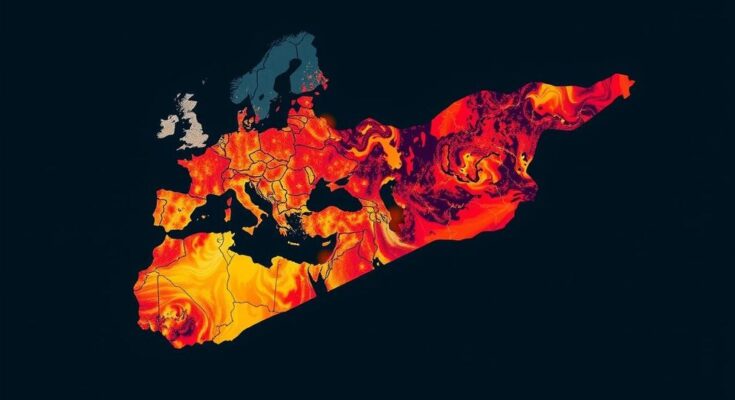The resurgence of Syria’s civil war poses significant dilemmas for Israel, which is caught between Iranian-backed extremists and Turkish-backed jihadists. Israel prefers a weakened Assad to mitigate direct threats while avoiding chaos. Regional dynamics involving Turkey, Iran, and Russia are altering the conflict landscape, presenting new security challenges for Israel.
The revival of the Syrian civil war has instigated complex dilemmas for Israel, compelling them to evaluate their regional positioning against both Iranian- and Turkish-backed adversaries. As Israeli authorities observe the shifting alliances and conflicts in northeastern Syria, their strategy requires a cautious, observatory role, allowing them to avoid direct confrontation unless their security interests are imminently threatened. Historical precedents suggest an Israeli preference for weakened adversaries, a balance that remains precarious given that a complete dismantling of Assad’s regime could introduce chaos and unpredictability along their borders.
The renewed hostilities were marked by a militant offensive in Aleppo on November 27, led by an alliance of hardline Sunni rebels against a backdrop of deteriorating conditions for Assad’s major allies. Prior to this offensive, escalating tensions from Hamas’s severe assault on Israel on October 7 had caused Hezbollah’s destabilization. This series of events enabled Syrian rebels to capitalize on the vulnerabilities of the Assad regime and its supporters, keenly aware of Syrian President Bashar Assad’s reliance on Iran amidst growing regional unrest.
Israel’s strategic calculus indicates an inclination for a weakened Assad who could eschew Iranian influence and pivot towards moderate Sunni alliances, as developments may herald increased Iranian military entrenchment in Syria. Despite some 70 targeted Israeli airstrikes against Iranian and Hezbollah installations over the past year, direct actions against the Syrian military remain avoided to prevent unnecessary escalation. The current dynamics present an intricate web of foreign interests, where any shifts could have profound implications for Israeli security.
Meanwhile, Turkey’s support for the Syrian rebels reflects President Erdogan’s dual motives of addressing domestic refugee concerns and countering Kurdish forces, intertwining Turkey’s national interests with broader Syrian developments. Conversely, Iran faces significant losses, having claimed a central role in the Syrian conflict, now jeopardized as its investment risks being undermined. Lastly, Russia’s involvement showcases an urgent need to uphold its influence in the region; following its active intervention in 2015, any losses for Assad substantially degrade Moscow’s strategic positioning in the face of US presence.
As the civil war rekindles, the stakes for Israel involve not just immediate security assessments but also the uncertain future of the Levantine geopolitical landscape. Israel’s preference leans towards retaining Assad’s regime to avoid the unpredictability of a post-Assad scenario, underscoring the delicate balance of power at play in the region.
The Syrian civil war, which erupted in 2011, has had escalating regional ramifications, particularly impacting Israel’s security calculus in light of shifting alliances and conflicts. The involvement of various actors including Iranian, Turkish, and Russian forces complicates the landscape, necessitating a careful appraisal of threats. The war’s resurgence post-October 7, sparked by Hamas’s attack on Israel, reinvigorates longstanding rifts and exposes the vulnerabilities of key regional players, shaping Israel’s strategic engagements.
In summary, the current developments in Syria reflect a nuanced interplay of regional powers with significant implications for Israeli security. Israel aims to maintain a precarious equilibrium by managing the threats posed by both Iranian and Turkish-backed factions while avoiding direct confrontation. The revival of the civil war underscores a broader instability, as weakened adversaries and unpredictable new leaders may reshape the geopolitical landscape, challenging Israel’s longstanding security paradigm and necessitating vigilant monitoring of rapid changes.
Original Source: www.jpost.com




